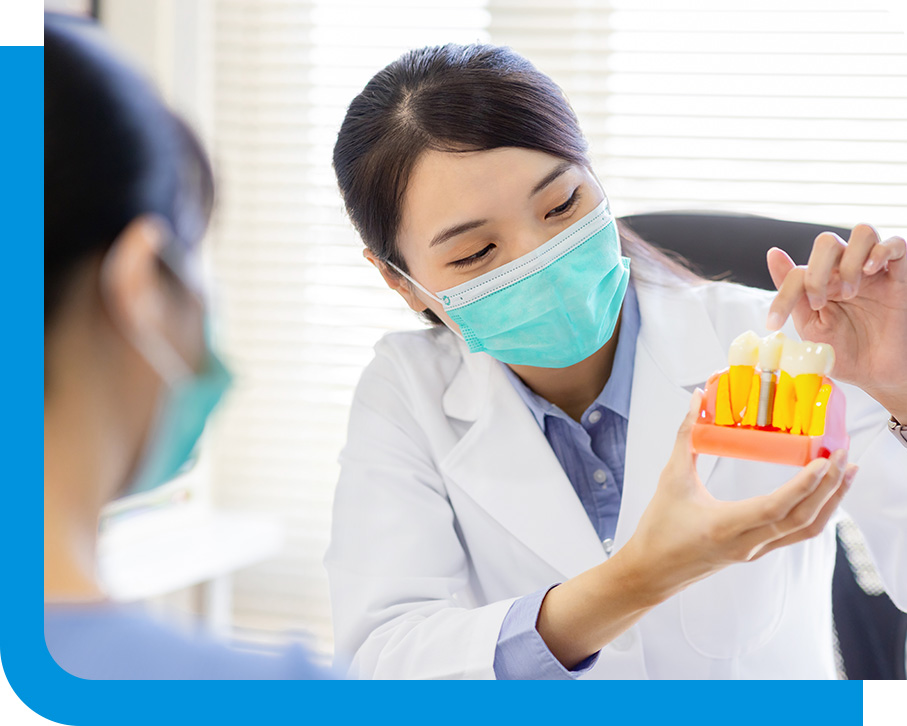Post-Op Instructions

Following oral surgery requires special care
to guarantee normal recovery and prevent problems. As a general rule, you should refrain from eating for at least two hours following surgery to allow the anaesthetic to wear off. Because you can’t feel your entire mouth, attempting to eat before this could cause soft tissue injury. The rules listed below serve as general recommendations. The dentist or surgical assistant will provide you with comprehensive advice on how to recuperate from surgery after your procedure.
A few days of pain are normal following a root canal operation. To prevent irritation of the area and to ensure that the temporary restorative material sets properly, you should refrain from eating on the side of your mouth where the treatment was conducted. To treat any infection that may still be present in your tooth, you might also need to take an antibiotic. Call your dentist right away if you have escalating discomfort or tenderness, a drug reaction, or the loss of the temporary restoration (filling).
A temporary restoration will be given to you first before your permanent crown or bridge. You should use caution when cleaning and eating since this is less durable than the permanent version. Brush the region gently, and avoid pulling up on the teeth with the floss because it might become loose. Likewise with eating. When the temporary is in, you should stay away from meals that are sticky or chewy.
After the temporary or permanent device is inserted, there can be some sensitivity and irritation. After the soft tissue heals, this will go away because it is normal. If the discomfort persists, a warm salt water rinse will be helpful, and you can also take Advil or Tylenol.
For a few days following the placement of the permanent crown or bridge, you could feel a little uncomfortable. The new tooth needs time to acclimate to your mouth, and in less than a week it should feel just like one of your natural teeth. You should inform your dentist if your bite feels off in any manner. Maintaining your bridge or crown is identical to maintaining your natural teeth. Regularly brushing and flossing is advised.
You will first obtain a temporary restoration before getting your permanent veneer. You should use caution when cleaning and eating since this is less durable than the permanent version. Brush the region gently, and avoid pulling up on the teeth with the floss because it might become loose. Likewise with eating. When the temporary is in, you should stay away from meals that are sticky or chewy.
After the temporary or permanent device is inserted, there can be some sensitivity and irritation. After the soft tissue heals, this will go away because it is normal. If the discomfort persists, a warm salt water rinse will be helpful, and you can also take Advil or Tylenol.
For a few days after the veneer is applied, it could feel a little strange. In less than a week, the replacement tooth should feel much like one of your natural teeth after your mouth has had time to acclimate to it. You should tell your dentist if your bite feels out of the ordinary in any manner. You should be very careful when brushing and flossing the area at the gum line where the veneer meets the tooth.
You will need to rest after the procedure. Because of the anaesthetic, you need to be driven home by a friend or relative. Following surgery, you should anticipate some bleeding at the extraction site. When the surgery is over, gauze will be applied; when it gets wet, you must change it. You should contact your dentist if bleeding lasts more than 24 hours. When you get home, rest, but do not lie flat. The bleeding may increase as a result. When lying down, elevate your head with a pillow. If you have pain, take the prescribed painkillers as suggested by your dentist. For pain relief, you can also use an ice pack. For pain relief, you can also use an ice pack. You might also receive a cleaning solution from your dentist to use on the extraction site.
After your surgery, your diet will be restricted to soft meals for a few days. Among the foods advised are:
- Gelatin
- Pudding
- Yogurt
- Mashed Potatoes
- Ice Cream
- Thin Soups
- …and other food you can eat without chewing.
Be sure not to use a straw when drinking. Your sutures can come undone, and the sucking motion might also hinder the blood clotting. The same is true of smoking. Call your dentist for a follow-up if you experience protracted discomfort, bleeding, itchiness, or don’t believe the extraction site is healing adequately.